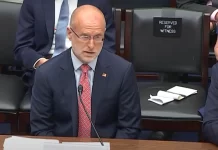Manchin’s middle-class tax hike and tax breaks for billionaires could be derailed by the vote of a single Democratic Senator.
Democrats are calling for a massive middle-class tax increase during an inflation crisis to pay for billions in corporate welfare. It sounds absurd, but it’s true.
The average American family will spend $5,520 more in 2022 to afford the same quality of life as 2021, and poll after poll shows rising costs are the nation’s biggest concern; yet Democrats in Congress are trying to raise taxes across the board to fund hundreds of billions in giveaways to politically-favored industries.
The so-called “Inflation Reduction Act” introduced by Sen. Joe Manchin in July is many things, but inflation reduction it is not. Analysis from the University of Pennsylvania’s Wharton School of Business, which Manchin previously said is his budgetary model of choice, says that the $739 billion behemoth is unlikely to have any impact at all on inflation. Congress’ nonpartisan Joint Committee on Taxation says it will raise taxes on every income bracket above $30,000 per year. President Biden has repeatedly pledged he would not raise taxes on any family making less than $400,000, but the committee found that the middle class and low earners will face the steepest tax hikes under the proposal.
Biden isn’t the only supporter willing to violate his commitments amid record inflation: both Manchin and Senate Majority Leader Chuck Schumer spoke out against tax increases during recession – notwithstanding the White House’s attempts to change the definition of the word for political gain.
If Biden, Manchin, and Schumer are unwilling to honor their promises to voters, another Democrat must rise to the occasion. Those suffering the real-world consequences of inflationary public policy are now turning to “swing state” senators like Sens. Maggie Hassan, Catherine Cortez-Masto, Mark Kelly, or Kyrsten Sinema to pursue common-sense solutions to inflation. Given the 50-50 split in the Senate, it only takes one vote. Here is what those on the fence should know when pondering Democrats’ last-gasp attempt to enact a litany of partisan priorities as their majority faces headwinds going into November’s midterm elections.
The bill’s name is nothing more than a ploy to deceive struggling Americans that Congress is taking on the biggest issue facing the country, when in reality they are doing the opposite. Instead of doing anything to help bring the economy out of recession, the bill raises taxes on the investment necessary for jobs and wage growth.
Democrats claim these taxes are borne by corporations, but it is well established and agreed upon by economists – including left-leaning experts – that much of the burden of corporate taxation is borne by workers. Estimates vary, but the Congressional Budget Office found that workers bear about 73% of the cost. For low-income households, the burden of corporate taxation outweighs that of individual income taxes.
The damage to the economy would be broad even as Manchin insists on the limited scope of tax hikes. The five industries hardest hit employ one in every four American workers, or about 40 million people in total.
Instead of doing anything to help increase energy abundance and bring down prices at the pump, the bill raises taxes on the energy industry. Instead of doing anything to help struggling small businesses, the bill sends more than $120 billion to the Internal Revenue Service to hire 87,000 more bureaucrats to soak Main Street and self-employed Americans for more of their hard-earned money. Not only do wealthy Americans and corporations have armies of lawyers and accountants to fend off the IRS, they are already the subject of a disproportionate share of audits. The IRS will go after those with more complicated taxes but without the resources to fight: small businesses, the self-employed, and low-income Americans who benefit from programs like the Earned Income Tax Credit.
All for what? The $739 billion will fund giveaways straight from Rep. Alexandria Ocasio-Cortez’s so-called “Green New Deal” and the wish lists of powerful corporate interests hoping to manipulate markets. There are $3 billion “climate justice” grants and another $3 billion for the U.S. Postal Service, but those pale in comparison to the tens of billions of dollars in corporate welfare for the electric vehicle industry – all, of course, intertwined with billions in giveaways and wage controls for labor unions in government and the private sector alike. The bill also sends tens of billions of dollars to health insurance companies without any reforms to increase the supply or improve the quality of care available to the American people.
Does that sound like inflation reduction to you?
Proponents claim the bill reduces the deficit by $300 billion, but those “savings” are a combination of “temporary” programs that will outlive all of us, rosy revenue estimates, and other Washington budget gimmicks that have never stood the test of reality.
Congressional Democrats have struggled for months to pass another reconciliation bill – legislation that can be passed with 51 votes in the Senate rather than 60, meaning it can move without bipartisan support. Their 2021 reconciliation bill, the so-called American Rescue Plan, cost nearly $2 trillion and added as much as 3 percentage points to inflation by the end of 2021, according to the Federal Reserve.
But President Biden and his fellow partisans clearly didn’t learn their lesson. They have denied responsibility for the inflation crisis and pushed for another blowout bill, this time with hundreds of billions in tax hikes. If Manchin’s legislation passes, it will ultimately be the American people – the ones who have been struggling to afford food and gas all year but received no respite from Washington – who will have to teach them.










